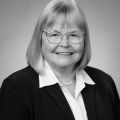Si quieres leyes que protejan nuestro medio ambiente, la única forma de conseguirlas es eligiendo buenos legisladores. El capítulo estatal de Washington de Sierra Club entrevista a los candidatos que se postulan para cargos públicos, respaldando a aquellos que cree que serán líderes ambientales. El comité luego apoya a los candidatos respaldados con fondos de los Comités de Acción Política (PAC) de Sierra Club, ya sea mediante contribuciones directas a los candidatos o a través de campañas impulsadas por voluntarios de Sierra Club.
Federal
La senadora Patty Murray ha sido una voz progresista consistente y fuerte en el Senado de los Estados Unidos. Ella está buscando la reelección para continuar luchando por nuestros derechos básicos y una mejor calidad de vida en Washington y más allá.
Murray fue elegida por primera vez en 1992 y ha sido una defensora de los veteranos, las familias trabajadoras, las mujeres y las oportunidades económicas para todos. Antes de su permanencia en el Senado, Murray trabajó como maestra de preescolar, en la Junta Escolar de Shoreline y en el Senado del estado de Washington.
Durante su tiempo en el Congreso, la Senadora Murray ha trabajado arduamente para mantener a nuestras comunidades a salvo de la violencia armada, proteger el acceso al aborto a nivel federal para que todos tengan libertad reproductiva y ampliar el acceso al cuidado infantil asequible. Este año, votó a favor de la Ley de Protección de la Salud de la Mujer, la Ley de Libertad de Voto y una lista de otros proyectos de ley progresistas que invierten en comunidades trabajadoras para que nuestro país sea un lugar donde todos puedan prosperar. Murray se ha ganado una impresionante y diversa coalición de respaldos de organizaciones locales y nacionales, líderes electos y sindicatos.
La senadora Murray se enfrenta a Tiffany Smiley, una enfermera de triaje que se postula en una plataforma republicana de MAGA. Smiley nunca ha ocupado un cargo público, pero anteriormente trabajó en Capitol Hill. Su agenda inspirada en Trump apunta a dividirnos mientras busca recortar los fondos de nuestros servicios más esenciales y reutilizarlos para un muro fronterizo innecesario y fuerzas policiales más militarizadas. Los trabajadores de Washington necesitan soluciones reales para que podamos acceder a lo básico como gasolina, comestibles, alquiler y medicamentos recetados, no a la retórica MAGA y las exenciones fiscales para los ricos.
La senadora Patty Murray es una líder nacional en muchos de los problemas más importantes que enfrenta nuestro país. Ella se ha ganado su voto para la reelección.
La senadora Patty Murray ha sido una voz progresista consistente y fuerte en el Senado de los Estados Unidos. Ella está buscando la reelección para continuar luchando por nuestros derechos básicos y una mejor calidad de vida en Washington y más allá.
Murray fue elegida por primera vez en 1992 y ha sido una defensora de los veteranos, las familias trabajadoras, las mujeres y las oportunidades económicas para todos. Antes de su permanencia en el Senado, Murray trabajó como maestra de preescolar, en la Junta Escolar de Shoreline y en el Senado del estado de Washington.
Durante su tiempo en el Congreso, la Senadora Murray ha trabajado arduamente para mantener a nuestras comunidades a salvo de la violencia armada, proteger el acceso al aborto a nivel federal para que todos tengan libertad reproductiva y ampliar el acceso al cuidado infantil asequible. Este año, votó a favor de la Ley de Protección de la Salud de la Mujer, la Ley de Libertad de Voto y una lista de otros proyectos de ley progresistas que invierten en comunidades trabajadoras para que nuestro país sea un lugar donde todos puedan prosperar. Murray se ha ganado una impresionante y diversa coalición de respaldos de organizaciones locales y nacionales, líderes electos y sindicatos.
La senadora Murray se enfrenta a Tiffany Smiley, una enfermera de triaje que se postula en una plataforma republicana de MAGA. Smiley nunca ha ocupado un cargo público, pero anteriormente trabajó en Capitol Hill. Su agenda inspirada en Trump apunta a dividirnos mientras busca recortar los fondos de nuestros servicios más esenciales y reutilizarlos para un muro fronterizo innecesario y fuerzas policiales más militarizadas. Los trabajadores de Washington necesitan soluciones reales para que podamos acceder a lo básico como gasolina, comestibles, alquiler y medicamentos recetados, no a la retórica MAGA y las exenciones fiscales para los ricos.
La senadora Patty Murray es una líder nacional en muchos de los problemas más importantes que enfrenta nuestro país. Ella se ha ganado su voto para la reelección.
Condado de Clark
Dependiendo de su lugar de residencia, es posible que en su papeleta figure una de las elecciones del condado que se indican a continuación.
La titular Alishia Topper se postula para la reelección a la oficina del tesoro del condado de Clark. Antes de comenzar el cargo en 2019, se desempeñó como miembro electo del Consejo Municipal de Vancouver y como gerente de servicios de impuestos dentro de la oficina del tesorero. Topper también se desempeña actualmente como presidenta de la de la Asociación de Tesoreros del Condado del Estado de Washington.
Durante su tiempo en el cargo, Topper ha trabajado arduamente para ofrecer servicios eficientes y rentables, incluidas tecnologías de pago mejoradas, procesos bancarios simplificados para la oficina y un servicio al cliente confiable. Si es reelegida, quiere continuar haciendo de la oficina del tesorero del condado un lugar inclusivo donde todos los residentes puedan acceder a los recursos y servicios financieros que necesitan y donde los ingresos públicos se administren de manera segura.
Alishia Topper es una líder comunitaria progresista, así como una tesorera del condado responsable y probada. Se merece su voto para otro mandato en el cargo
La titular Alishia Topper se postula para la reelección a la oficina del tesoro del condado de Clark. Antes de comenzar el cargo en 2019, se desempeñó como miembro electo del Consejo Municipal de Vancouver y como gerente de servicios de impuestos dentro de la oficina del tesorero. Topper también se desempeña actualmente como presidenta de la de la Asociación de Tesoreros del Condado del Estado de Washington.
Durante su tiempo en el cargo, Topper ha trabajado arduamente para ofrecer servicios eficientes y rentables, incluidas tecnologías de pago mejoradas, procesos bancarios simplificados para la oficina y un servicio al cliente confiable. Si es reelegida, quiere continuar haciendo de la oficina del tesorero del condado un lugar inclusivo donde todos los residentes puedan acceder a los recursos y servicios financieros que necesitan y donde los ingresos públicos se administren de manera segura.
Alishia Topper es una líder comunitaria progresista, así como una tesorera del condado responsable y probada. Se merece su voto para otro mandato en el cargo
Carreras de distritos del consejo del condado
Clark County, District 1
Community leader Hector Hinojosa is running to serve District 1 on the Clark County Council. Hinojosa has spent over 40 years in the semiconductor industry and he founded the Community Roots Collaborative, a local organization that built 20 tiny homes for people experiencing housing insecurity. Additionally, he serves on the Clark College Social Equity Advisory Committee and advises the county sheriff’s office.
Hinojosa is running on a platform that emphasizes keeping people housed, smart development, and making sure law enforcement treats everyone with dignity and respect. If elected, he wants to address climate change, racial inequities at the county level, and aging public transportation infrastructure. In this race, Hinojosa is supported by the local Democrats and progressive elected officials.
Glen Yung is running against Hinojosa in District 1. After a career in finance, Yung began a local remodeling company and he also serves on the executive board of the National Alliance on Mental Illness. He is running on a vague platform to steward our natural resources, increase affordable housing, and invest in public safety.
Hinojosa is the best choice in this race and deserves your vote to represent District 1 on the Clark County Council.
Community leader Hector Hinojosa is running to serve District 1 on the Clark County Council. Hinojosa has spent over 40 years in the semiconductor industry and he founded the Community Roots Collaborative, a local organization that built 20 tiny homes for people experiencing housing insecurity. Additionally, he serves on the Clark College Social Equity Advisory Committee and advises the county sheriff’s office.
Hinojosa is running on a platform that emphasizes keeping people housed, smart development, and making sure law enforcement treats everyone with dignity and respect. If elected, he wants to address climate change, racial inequities at the county level, and aging public transportation infrastructure. In this race, Hinojosa is supported by the local Democrats and progressive elected officials.
Glen Yung is running against Hinojosa in District 1. After a career in finance, Yung began a local remodeling company and he also serves on the executive board of the National Alliance on Mental Illness. He is running on a vague platform to steward our natural resources, increase affordable housing, and invest in public safety.
Hinojosa is the best choice in this race and deserves your vote to represent District 1 on the Clark County Council.
Clark County, District 2
Chartisha Roberts is running to be the Clark County Councilor in District 2. Roberts has worked in the health care and transportation sectors working in human resources. She is a community leader with extensive experience working on youth mentoring, equity issues, and food bank services.
Roberts is running to put her administrative and leadership skills to use making Clark County a safe place to live where all residents have the opportunity to thrive. Her priorities include putting public health first, investing in a resilient local economy, and addressing the affordability crisis to make sure people in Clark County can access stable housing.
Roberts is running against Michelle Belkot, a veteran and federal procurement manager running on a vague, conservative platform that fails to address the most pressing needs of Clark County residents. Last year, she ran unsuccessfully for Vancouver School Board on a MAGA campaign to oppose masks and COVID safety protocols for our students and promote misinformation in our students’ history books.
We recommend Chartisha Roberts for District 2 on the Clark County Council because of her community-centric vision and the support she has earned from partner organizations.
Chartisha Roberts is running to be the Clark County Councilor in District 2. Roberts has worked in the health care and transportation sectors working in human resources. She is a community leader with extensive experience working on youth mentoring, equity issues, and food bank services.
Roberts is running to put her administrative and leadership skills to use making Clark County a safe place to live where all residents have the opportunity to thrive. Her priorities include putting public health first, investing in a resilient local economy, and addressing the affordability crisis to make sure people in Clark County can access stable housing.
Roberts is running against Michelle Belkot, a veteran and federal procurement manager running on a vague, conservative platform that fails to address the most pressing needs of Clark County residents. Last year, she ran unsuccessfully for Vancouver School Board on a MAGA campaign to oppose masks and COVID safety protocols for our students and promote misinformation in our students’ history books.
We recommend Chartisha Roberts for District 2 on the Clark County Council because of her community-centric vision and the support she has earned from partner organizations.
Clark County, District 5
Sue Marshall is a third-generation family farmer running for Clark County Council in District 5. She is a community leader who has focused on issues affecting working families and the environment. Now she serves as the board supervisor of the Clark Conservation District and on the county’s Clean Water Commission.
Her background in community advocacy and balancing the interests of local farming and environmental protections make her a good fit to represent District 5. If elected, Marshall wants to work on sustainable growth, clean climate practices, and efficient county services in order to create a healthy rural economy and high quality of life for residents. She is supported by more progressive organizations and community leaders than her Republican opponent in this nonpartisan race.
Her opponent is Don Benton, a former Republican state legislator who served in both the House and Senate. He later went on to be Trump’s 2016 Washington state campaign chairman and serve as the chair of the state Republican party. Benton’s platform in this race is full of MAGA Republican rhetoric that doesn't offer real solutions to the issues facing our communities but rather casts blame on those of us struggling the most.
While she is not a progressive, Sue Marshall is the best choice in this race and deserves your vote to serve District 5 on the Clark County Council.
Sue Marshall is a third-generation family farmer running for Clark County Council in District 5. She is a community leader who has focused on issues affecting working families and the environment. Now she serves as the board supervisor of the Clark Conservation District and on the county’s Clean Water Commission.
Her background in community advocacy and balancing the interests of local farming and environmental protections make her a good fit to represent District 5. If elected, Marshall wants to work on sustainable growth, clean climate practices, and efficient county services in order to create a healthy rural economy and high quality of life for residents. She is supported by more progressive organizations and community leaders than her Republican opponent in this nonpartisan race.
Her opponent is Don Benton, a former Republican state legislator who served in both the House and Senate. He later went on to be Trump’s 2016 Washington state campaign chairman and serve as the chair of the state Republican party. Benton’s platform in this race is full of MAGA Republican rhetoric that doesn't offer real solutions to the issues facing our communities but rather casts blame on those of us struggling the most.
While she is not a progressive, Sue Marshall is the best choice in this race and deserves your vote to serve District 5 on the Clark County Council.
Comisión del Condado
Island County, District 3
La comisionada demócrata Janet St. Clair se postula para la reelección al Distrito 3 en la Comisión del Condado de Island, donde ha servido durante los últimos cuatro años. Además, St. Clair preside la Junta de Salud y está involucrado en el liderazgo de juntas de organizaciones sin fines de lucro y otras juntas comunitarias, incluso anteriormente se desempeñó como directora ejecutiva de Sound Water Stewards.
Como comisionada, St. Clair ha trabajado arduamente para proteger el acceso al cuidado de salud en el condado, invertir en acceso de banda ancha público, crear el Grupo de Trabajo de Vivienda Asequible en Camano Island, y abordar la crisis climática. Si es reelegida, quiere enfocarse en ser receptiva y estar disponible para la comunidad. St. Clair también continuaría expandiendo el acceso de banda ancha, protegiendo nuestro ecosistema local para las generaciones venideras, creando opciones de vivienda asequible y servicios de cuidado infantil, y trayendo empleos con salarios dignos al Condado de Island.
El oponente de Clair, Timothy Hazelo, es un técnico de simulación de vuelo que se presenta con una plataforma conservadora que señala la culpa en lugar de ofrecer soluciones políticas que beneficiarían a nuestras comunidades. Si es elegido, buscaría recortar los fondos comunitarios que benefician el acceso al cuidado de salud, la vivienda estable, las escuelas de calidad y los parques.
Janet St. Clair es la opción clara en esta elección. Se merece su voto para permanecer como comisionada del Distrito 3.
La comisionada demócrata Janet St. Clair se postula para la reelección al Distrito 3 en la Comisión del Condado de Island, donde ha servido durante los últimos cuatro años. Además, St. Clair preside la Junta de Salud y está involucrado en el liderazgo de juntas de organizaciones sin fines de lucro y otras juntas comunitarias, incluso anteriormente se desempeñó como directora ejecutiva de Sound Water Stewards.
Como comisionada, St. Clair ha trabajado arduamente para proteger el acceso al cuidado de salud en el condado, invertir en acceso de banda ancha público, crear el Grupo de Trabajo de Vivienda Asequible en Camano Island, y abordar la crisis climática. Si es reelegida, quiere enfocarse en ser receptiva y estar disponible para la comunidad. St. Clair también continuaría expandiendo el acceso de banda ancha, protegiendo nuestro ecosistema local para las generaciones venideras, creando opciones de vivienda asequible y servicios de cuidado infantil, y trayendo empleos con salarios dignos al Condado de Island.
El oponente de Clair, Timothy Hazelo, es un técnico de simulación de vuelo que se presenta con una plataforma conservadora que señala la culpa en lugar de ofrecer soluciones políticas que beneficiarían a nuestras comunidades. Si es elegido, buscaría recortar los fondos comunitarios que benefician el acceso al cuidado de salud, la vivienda estable, las escuelas de calidad y los parques.
Janet St. Clair es la opción clara en esta elección. Se merece su voto para permanecer como comisionada del Distrito 3.
Thurston County, District 3
El demócrata Tye Menser se postula para la reelección a la Comisión del Condado de Thurston por el Distrito 3. Menser es abogado, presidente de la Junta de Salud del Condado de Thurston y comisionado de la Junta de Conservación del Agua del Condado de Thurston. Fue elegido como comisionado del condado en 2018 y ha sido un defensor de la acción climática, la reforma de la justicia penal y el apoyo a las pequeñas empresas desde entonces.
Como comisionado, Menser ha ayudado a aprobar un Plan de Mitigación del Clima, ha invertido en viviendas asequibles y ha creado más programas de desviación de justicia penal. Sus prioridades de reelección incluyen proteger nuestro entorno natural para las generaciones venideras, garantizar que los residentes puedan acceder a una vivienda estable, crear soluciones fuera de la policía y las prisiones para abordar los problemas sociales, y continuar ayudando a las pequeñas empresas a recuperarse de la pandemia. Menser se ha ganado un apoyo impresionante y generalizado en esta elección, incluidos los respaldos de sindicatos locales, progresistas electos y organizaciones comunitarias.
La republicana Vivian Easer se enfrenta a Menser. Easer es miembro de la junta de Gestión de Emergencias del Estado de Washington y ha trabajado en la preparación para emergencias y dentro del sistema de justicia penal. Se está postulando en una plataforma conservadora para recortar los fondos de las inversiones comunitarias esenciales en vivienda, educación y cuidado de salud, mientras invierte más dinero en militarizar y expandir las fuerzas policiales en nuestros vecindarios.
Menser se ha ganado su voto para la Comisión del Condado de Thurston en el Distrito 3 para continuar trayendo un liderazgo sostenible y centrado en la comunidad al condado.
El demócrata Tye Menser se postula para la reelección a la Comisión del Condado de Thurston por el Distrito 3. Menser es abogado, presidente de la Junta de Salud del Condado de Thurston y comisionado de la Junta de Conservación del Agua del Condado de Thurston. Fue elegido como comisionado del condado en 2018 y ha sido un defensor de la acción climática, la reforma de la justicia penal y el apoyo a las pequeñas empresas desde entonces.
Como comisionado, Menser ha ayudado a aprobar un Plan de Mitigación del Clima, ha invertido en viviendas asequibles y ha creado más programas de desviación de justicia penal. Sus prioridades de reelección incluyen proteger nuestro entorno natural para las generaciones venideras, garantizar que los residentes puedan acceder a una vivienda estable, crear soluciones fuera de la policía y las prisiones para abordar los problemas sociales, y continuar ayudando a las pequeñas empresas a recuperarse de la pandemia. Menser se ha ganado un apoyo impresionante y generalizado en esta elección, incluidos los respaldos de sindicatos locales, progresistas electos y organizaciones comunitarias.
La republicana Vivian Easer se enfrenta a Menser. Easer es miembro de la junta de Gestión de Emergencias del Estado de Washington y ha trabajado en la preparación para emergencias y dentro del sistema de justicia penal. Se está postulando en una plataforma conservadora para recortar los fondos de las inversiones comunitarias esenciales en vivienda, educación y cuidado de salud, mientras invierte más dinero en militarizar y expandir las fuerzas policiales en nuestros vecindarios.
Menser se ha ganado su voto para la Comisión del Condado de Thurston en el Distrito 3 para continuar trayendo un liderazgo sostenible y centrado en la comunidad al condado.
Clark County Public Utilities
Dependiendo de su lugar de residencia, es posible que en su papeleta figure una de las elecciones que se indican a continuación.
Environmentalist and climate activist Don Steinke is running for the District 2 seat on the Clark County Public Utilities District Board of Commissioners. Steinke is a retired teacher who has received recognition for his climate justice work in Clark County and Washington broadly. Now, he is running to make the Clark County PUD a leader in electric and green utilities.
Steinke’s platform is focused on bold climate action with the overarching goal of helping the county drastically reduce emissions. If elected, he wants to modernize the PUD to bring it in line with the renewable energy goals of the county and work with other local governments to enact environmental protections. As a respected climate activist in the area, Steinke has earned broad community support in this campaign.
Steinke is challenging incumbent commissioner Nancy Barnes, who first joined the PUD in 1992. She is running on a status quo platform that primarily emphasizes the PUD’s stable rates and reliability, though she does list some environmental goals on her campaign website. Outside of the PUD, Barnes is also a board member of the American Public Power Association.
Don Steinke has the strongest vision for a sustainable climate future and the role of the PUD in bringing it about. He deserves your vote for Clark County PUD commissioner in District 2.
Environmentalist and climate activist Don Steinke is running for the District 2 seat on the Clark County Public Utilities District Board of Commissioners. Steinke is a retired teacher who has received recognition for his climate justice work in Clark County and Washington broadly. Now, he is running to make the Clark County PUD a leader in electric and green utilities.
Steinke’s platform is focused on bold climate action with the overarching goal of helping the county drastically reduce emissions. If elected, he wants to modernize the PUD to bring it in line with the renewable energy goals of the county and work with other local governments to enact environmental protections. As a respected climate activist in the area, Steinke has earned broad community support in this campaign.
Steinke is challenging incumbent commissioner Nancy Barnes, who first joined the PUD in 1992. She is running on a status quo platform that primarily emphasizes the PUD’s stable rates and reliability, though she does list some environmental goals on her campaign website. Outside of the PUD, Barnes is also a board member of the American Public Power Association.
Don Steinke has the strongest vision for a sustainable climate future and the role of the PUD in bringing it about. He deserves your vote for Clark County PUD commissioner in District 2.
Temas en la Votación de la Ciudad Seattle
Dependiendo de dónde vivas, es posible que tengas las siguientes elecciones municipales en tu papeleta.
We recommend voting Yes on Question 1 and voting for Proposition 1B on Question 2.
More than ever before, voters are looking for meaningful choices in elections, with a strong desire to make campaigns less toxic and ensure that our voices are heard. To that end, two propositions appear on the ballot together this year: Seattle Propositions 1A and 1B. While both offer alternatives to the single-choice voting system currently used in Seattle primary elections, Proposition 1B, which offers ranked choice voting, is the most effective and most thoroughly tested method for increasing representation.
This ballot measure first asks whether either of the propositions should be approved and second asks you to choose between the two, regardless of whether you believe either should be enacted. If the first question passes with a simple majority, the proposition with the most votes from the second question will be approved.
Proposition 1A refers to Initiative Petition 134 to introduce "approval voting," a method by which voters vote for any and all candidates they approve of. In this system, the two candidates receiving the most total votes for office will continue on to the general election. Some community leaders have voiced concern over the legality of this system and whether it violates the one person, one vote principle. In places where this has been tried, some voters still choose to vote for one candidate so that they don't dilute support for their favorite candidate.
Ranked choice voting is backed by much more extensive data and research than approval voting. Ranked choice voting has already been implemented in 26 U.S. cities and states, including New York City, Maine, Alaska, and many organizations and countries around the world, compared to just two cities - Fargo and St. Louis - for approval voting. In addition, progressives have raised concern about whether approval voting will give an outsized electoral say to wealthier and whiter primary voters due to its design, which can allow smaller, more homogenous groups of voters to choose both candidates that advance to the general election.
Ranked choice voting is simple - voters rank candidates in order of preference, and can rank as many candidates as they choose without hurting the chances of their favored candidate. If there is no majority winner, meaning no candidate receives more than half of the first choices, the candidate with the fewest votes is eliminated, and any voter who picked that candidate as their top choice will have their next choice counted, until a majority winner emerges.
Vote "Yes" on Question 1 and vote for Proposition 1B on Question 2 to bring ranked choice voting to Seattle primary elections.
We recommend voting Yes on Question 1 and voting for Proposition 1B on Question 2.
More than ever before, voters are looking for meaningful choices in elections, with a strong desire to make campaigns less toxic and ensure that our voices are heard. To that end, two propositions appear on the ballot together this year: Seattle Propositions 1A and 1B. While both offer alternatives to the single-choice voting system currently used in Seattle primary elections, Proposition 1B, which offers ranked choice voting, is the most effective and most thoroughly tested method for increasing representation.
This ballot measure first asks whether either of the propositions should be approved and second asks you to choose between the two, regardless of whether you believe either should be enacted. If the first question passes with a simple majority, the proposition with the most votes from the second question will be approved.
Proposition 1A refers to Initiative Petition 134 to introduce "approval voting," a method by which voters vote for any and all candidates they approve of. In this system, the two candidates receiving the most total votes for office will continue on to the general election. Some community leaders have voiced concern over the legality of this system and whether it violates the one person, one vote principle. In places where this has been tried, some voters still choose to vote for one candidate so that they don't dilute support for their favorite candidate.
Ranked choice voting is backed by much more extensive data and research than approval voting. Ranked choice voting has already been implemented in 26 U.S. cities and states, including New York City, Maine, Alaska, and many organizations and countries around the world, compared to just two cities - Fargo and St. Louis - for approval voting. In addition, progressives have raised concern about whether approval voting will give an outsized electoral say to wealthier and whiter primary voters due to its design, which can allow smaller, more homogenous groups of voters to choose both candidates that advance to the general election.
Ranked choice voting is simple - voters rank candidates in order of preference, and can rank as many candidates as they choose without hurting the chances of their favored candidate. If there is no majority winner, meaning no candidate receives more than half of the first choices, the candidate with the fewest votes is eliminated, and any voter who picked that candidate as their top choice will have their next choice counted, until a majority winner emerges.
Vote "Yes" on Question 1 and vote for Proposition 1B on Question 2 to bring ranked choice voting to Seattle primary elections.








